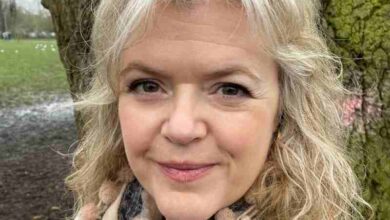Amanda Roocroft: The Journey of a Distinguished English Soprano

Amanda Roocroft stands among the most admired English sopranos of her generation. With her emotionally compelling voice, versatility in repertoire, and commanding stage presence, she has carved a remarkable career in the international opera scene. Born in Lancashire and educated in some of the country’s finest music institutions, she not only excelled as a performer but also became a respected mentor to the next generation of vocal artists. This article explores her early life, career highlights, recordings, teaching contributions, and the unique qualities that make Amanda Roocroft a household name in the world of opera.
Early Life and Musical Beginnings
Amanda Jane Roocroft was born on 9 February 1966 in Coppull, a small mining village in Lancashire. Her early years were shaped by music and community, as she began learning piano and cornet at a young age. She also performed in a brass band until her early twenties, which laid the foundations of her musical discipline and ear for ensemble playing.
Her secondary education at Southlands High School and later Runshaw College brought her closer to formal training in music. However, the defining moment in her development came when she entered the Royal Northern College of Music (RNCM). There she studied under the guidance of Barbara Robotham, whose teaching shaped her vocal technique and interpretative depth.
In 1988, Roocroft won the prestigious Kathleen Ferrier Award, a recognition that propelled her into the limelight of Britain’s classical music scene. That same year, her standout performance as Fiordiligi in Così fan tutte marked the beginning of a career filled with promise.
The Road to Operatic Success
Amanda Roocroft’s professional debut came in 1990 with the Welsh National Opera, where she performed as Sophie in Der Rosenkavalier. This marked the start of a journey that would take her to some of the world’s most respected opera houses.
Only a year later, she appeared at the Royal Opera House as Pamina in The Magic Flute and at Glyndebourne as Fiordiligi in Così fan tutte. Her ability to combine technical mastery with emotional honesty made her a natural fit for these roles. By 1993, she had already been invited to perform at the Bavarian State Opera and the English National Opera, securing her position as one of Britain’s most exciting new sopranos.
Signature Roles and International Acclaim
Amanda Roocroft’s career is defined not just by the breadth of her repertoire but also by the intensity she brought to each character. Her portrayals have spanned from Mozart heroines to complex roles in twentieth-century opera.
Among her most celebrated roles are:
-
Fiordiligi in Così fan tutte – A role that followed her from early student performances into major houses, showcasing her strong upper register and lyrical phrasing.
-
Jenůfa in Janáček’s Jenůfa – This portrayal at the English National Opera earned her the 2007 Laurence Olivier Award for Outstanding Achievement in Opera. Critics praised her ability to convey the character’s suffering and resilience with haunting beauty.
-
Ellen Orford in Britten’s Peter Grimes – A challenging role that displayed her warmth and strength, cementing her reputation as a leading interpreter of Britten.
-
Emilia Marty in Janáček’s The Makropulos Case – A role demanding dramatic intensity and emotional range, which she delivered with remarkable authority.
-
Káťa Kabanová in Káťa Kabanová – Another Janáček heroine that allowed her to demonstrate both vulnerability and vocal power.
Her international acclaim was further bolstered by performances at the Metropolitan Opera, Houston Grand Opera, and the major concert halls of Europe. She became recognised as one of the finest singing actresses of her time.
Performances on the World Stage
Amanda Roocroft made her Metropolitan Opera debut in 1997 as Donna Elvira in Don Giovanni. This marked a significant milestone, establishing her presence on the American operatic stage. She later went on to appear in productions such as Britten’s The Turn of the Screw at the Houston Grand Opera, expanding her reputation in the United States.
In Europe, she performed at leading venues such as the Bavarian State Opera, the Royal Opera House, Glyndebourne Festival, and La Monnaie in Brussels. Her concerts and recitals took her to the Musikverein in Vienna, the Concertgebouw in Amsterdam, Lincoln Center in New York, and Wigmore Hall in London.
Recordings and Musical Legacy
Amanda Roocroft’s artistry extends beyond the opera stage. She has made numerous recordings that capture the richness of her voice and the depth of her interpretations. Her discography includes:
-
Così fan tutte, where she sings the role of Fiordiligi.
-
Symphonic works such as Mahler’s Symphony No. 4 under the baton of Sir Simon Rattle.
-
Recital discs with the London Philharmonic Orchestra conducted by Franz Welser-Möst.
-
Elgar: Complete Songs, which earned her critical acclaim and international recognition.
These recordings have not only preserved her artistry for future generations but also highlighted her versatility, moving effortlessly between opera, lieder, and symphonic repertoire.
Teaching and Mentorship
Beyond her performance career, Amanda Roocroft has dedicated herself to teaching and mentoring young singers. She currently serves as a Professor of Vocal Studies at the Royal College of Music in London and is also a Fellow of the Royal Northern College of Music. Her teaching philosophy focuses on authenticity, emotional expression, and technical discipline.
She has conducted masterclasses at institutions such as the Guildhall School of Music and Drama, Cambridge University, and the Royal Opera House’s Young Artist Programme. Her work as a visiting tutor at the Royal Birmingham Conservatoire since 2018 further demonstrates her commitment to nurturing the next generation of vocal talent.
Overcoming Challenges and Personal Reflections
Despite her success, Amanda Roocroft has been candid about the challenges of her career. At times, she considered leaving the profession due to the pressures of performance and the pursuit of perfection. However, her resilience and faith helped her navigate these difficulties, allowing her to find renewed strength in her artistry.
She has expressed that she never sought fame for its own sake, preferring instead to focus on respect from her peers and the integrity of her performances. This outlook has resonated with audiences and students alike, making her a role model not only for her musical achievements but also for her grounded approach to life.
Awards and Recognition
Amanda Roocroft’s contributions to opera have been widely recognised. The most notable accolade is her Laurence Olivier Award in 2007 for her role in Jenůfa. This recognition placed her among the greatest performers in British opera and highlighted her ability to transform the stage into an emotional landscape.
Her continued influence as a performer and educator has also been acknowledged through her appointments at leading music colleges and conservatoires.
The Legacy of Amanda Roocroft
Amanda Roocroft’s career represents more than a collection of operatic triumphs. She embodies the qualities of dedication, artistry, and authenticity that define the very essence of opera. From her humble beginnings in a Lancashire village to international stages, she has inspired audiences and students with her artistry and honesty.
Her legacy lies not only in her recordings and performances but also in the countless young singers she continues to mentor. Through her teaching, she ensures that the traditions of classical music remain vibrant while also encouraging individuality and personal expression.
Conclusion
Amanda Roocroft is a true icon of British opera. Her journey from a brass band in Lancashire to the world’s leading opera houses is a testament to talent, determination, and resilience. With her celebrated interpretations of Mozart, Britten, and Janáček, her award-winning performances, and her contributions as a teacher, she has left an indelible mark on the cultural landscape.
In an age where opera competes with modern entertainment, Amanda Roocroft remains proof of the timeless power of the human voice. Her artistry continues to resonate, reminding us that authenticity and emotional truth are the foundations of all great performance.



